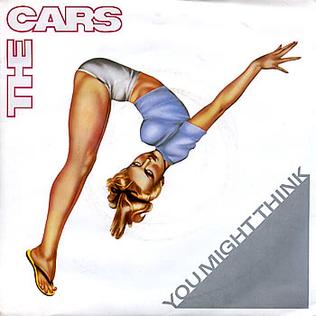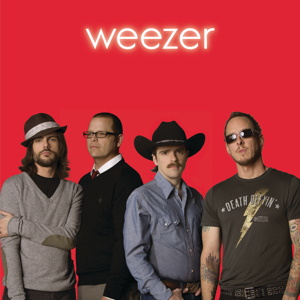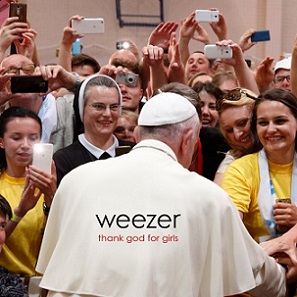Other
- The End of the Game (1919 film)
- The End of the Game (1975 film)
- The End of the Game, a 1986 novel by Sheri S. Tepper
The End of the Game is a 1970 album by Peter Green.
The End of the Game may also refer to:

Weezer is an American rock band formed in Los Angeles, California, in 1992. Since 2001, the band has consisted of Rivers Cuomo, Patrick Wilson, Brian Bell, and Scott Shriner. They have sold 10 million albums in the US and more than 35 million worldwide.

Weezer is the third studio album by American rock band Weezer. It was released on May 15, 2001, by Geffen Records. It was the second Weezer album produced by Ric Ocasek, who produced their debut album, and it is the only studio album to feature bassist Mikey Welsh, as he left the band a few months after the album's release.

Rivers Cuomo is an American musician. He is best known as the lead vocalist, guitarist, and songwriter of the rock band Weezer.

Patrick George Wilson is an American musician, singer and songwriter. He is best known as the drummer and cofounding member of the rock band Weezer, with whom he has recorded 15 studio albums.

Make Believe is the fifth studio album by American rock band Weezer. It was released on May 10, 2005, by Geffen Records. The album was considered to be a return to some of the emotionally vulnerable lyrics of Weezer's previous releases, and due to the strength of the hit single "Beverly Hills", the album was a commercial success, peaking at number two on the US Billboard 200 and number eleven on the UK Albums Chart. In addition, "Beverly Hills" also earned Weezer their first Grammy nomination for Best Rock Song. Despite this, Make Believe received mixed reviews from critics and fans, although it has remained a consistent seller. The recording process of Make Believe began prior to the release of their previous album, Maladroit; however, it was prolonged compared to the recording of most of Weezer's previous albums, and lasted for almost three years. Rivers Cuomo's songwriting on Make Believe was described as "[a] return to musical, emotional bloodletting", although the lyrics were noticeably simpler than before.

"Buddy Holly" is a song by the American rock band Weezer. The song was written by Rivers Cuomo and released by DGC as the second single from the band's debut album, Weezer (1994). The lyrics reference the song's namesake, 1950s rock-and-roll singer Buddy Holly, and actress Mary Tyler Moore. Released on September 7, 1994—which would have been Holly's 58th birthday—the song reached number two on the US Billboard Modern Rock Tracks chart and number 18 on the Billboard Hot 100 Airplay chart. Outside the US, the song peaked at number six in Canada, number 12 in the United Kingdom, number 13 in Iceland, and number 14 in Sweden. The song's music video, directed by Spike Jonze, earned considerable exposure when it was included as a bonus media file in Microsoft's initial successful release of the operating system, Windows 95.

"Say It Ain't So" is a song by American rock band Weezer. It was released as the third and final single from the band's self-titled 1994 debut album on May 15, 1995. Written by frontman Rivers Cuomo, the song came to be after he had all the music finished and one line, "Say it ain't so". Cuomo made a connection to an incident in high school where he came home and saw a bottle of beer in the fridge. He believed his mother and father's marriage ended because his father was an alcoholic, and this made him fear the marriage between his mother and step-father would end this way as well.

"El Scorcho" is a song by the American rock band Weezer. It is the first single from the band's second album, Pinkerton, released in 1996. The music video features the band playing in an old ballroom in Los Angeles, surrounded by light fixtures of diverse origin, flashing in time to the music. The name of the song supposedly came from a packet of hot sauce from Del Taco, labeled "Del Scorcho".

"Island in the Sun" is a song by the American rock band Weezer. It is the second single from the band's second self-titled album Weezer, released in 2001. "Island in the Sun" was not originally planned to be on the album, but producer Ric Ocasek fought for its inclusion. It was a successful radio single and perhaps the band's biggest hit ever outside of the United States, reaching No. 31 in the UK and No. 17 in France. In January 2002, the Australian Triple J Hottest 100 ranked the song 7 in its 2001 countdown. "Island in the Sun" is also the most-licensed track in the Weezer catalog. In 2009, Pitchfork named it the 495th greatest song of the 2000s.

"Beverly Hills" is a song by American rock band Weezer. It is the first single from the band's fifth album, Make Believe. "Beverly Hills" was released to US radio on March 28, 2005. The song features Stephanie Eitel of Agent Sparks on the chorus on backup vocals, performing the "gimme, gimme" hook.

"You Might Think" is a song by American rock band the Cars from their fifth studio album, Heartbeat City (1984). The track was written by Ric Ocasek and produced by Mutt Lange and the Cars, with Ocasek also providing the lead vocals.

The discography of Weezer, an American rock band, consists of 15 studio albums, two compilation albums, one video album, nine extended plays, 37 singles and 40 music videos. Weezer's self-titled debut studio album, often referred to as The Blue Album, was released in May 1994 through DGC Records. The album was a commercial success, peaking at number 16 on the US Billboard 200 and spawning the singles "Undone – The Sweater Song" and "Buddy Holly", both of which were responsible for launching Weezer into mainstream success with the aid of music videos directed by Spike Jonze. It has sold 3.3 million copies in the United States and has been certified triple platinum by the Recording Industry Association of America (RIAA), becoming the band's best selling album to date. Following the success of their debut album, Weezer took a break from touring for the Christmas holidays. Lead singer Rivers Cuomo began piecing together demo material for Weezer's second studio album. Cuomo's original concept for the album was a space-themed rock opera, Songs from the Black Hole. Ultimately, the Songs from the Black Hole album concept was dropped; the band, however, continued to utilize songs from these sessions into work for their second studio album. Pinkerton was released as the band's second studio album in September 1996. Peaking at number 19 on the Billboard 200, it was considered a critical and commercial failure at the time of its release, selling far less than its triple platinum predecessor. However, in the years following its release, it has seen much critical and commercial championing.

Weezer is the sixth studio album and third self-titled album by the American rock band Weezer, released on June 3, 2008, by DGC and Interscope Records. Rick Rubin and Jacknife Lee both produced parts of the album, with the band producing a handful of tracks themselves. Like in the band's 1994 debut, all band members contributed to songwriting. This is the first and, so far, the only Weezer album to feature lead vocals from all four band members. The album also features more musical experimentation in comparison to their previous efforts, especially shown in such songs as "Dreamin'", "The Angel and The One", and "The Greatest Man That Ever Lived".

"Pork and Beans" is a song by the American alternative rock band Weezer, released on the group's 2008 self-titled album Weezer, also known as the Red Album. It was released to radio on April 22, 2008 and released in digital form on April 24. The track debuted at number 19 on Billboard's Modern Rock chart, and spent eleven weeks at number one. The song charted in many countries such as Canada, Ireland, the United Kingdom, and the United States.

"The Greatest Man That Ever Lived (Variations on a Shaker Hymn)" is a song released as an iTunes single from American alternative rock band Weezer's sixth album, Weezer (2008). "The Greatest Man That Ever Lived (Variations on a Shaker Hymn)" was released to radio on December 9, 2008. The song bears a resemblance to the Shaker song "Simple Gifts" hence the "(Variations on a Shaker Hymn)" in the title. According to lead vocalist and writer Rivers Cuomo, "The Greatest Man" has 11 different themes, including rapping and imitations of other bands such as Nirvana and Aerosmith (both of whom also recorded for Weezer's then-label Geffen Records at one point).

"Back to the Shack" is a song by the American rock band Weezer. It was released as the first single from their ninth studio album Everything Will Be Alright in the End on July 22, 2014. The song was sent to radio stations and uploaded to Weezer's YouTube channel a day before the single's official release. It was written in response to the band's past several albums, with lead vocalist Rivers Cuomo wanting to return to their roots. The song received generally favorable reviews.

"Thank God for Girls" is a song by American rock band Weezer. The song was released on October 26, 2015. The release of the song was accompanied by a lyric video which prominently features the cannoli mentioned in the song's first verse.

Van Weezer is the fifteenth studio album by American rock band Weezer, released on May 7, 2021, by Crush Music and Atlantic Records. Featuring a classic rock and hard rock inspired sound, the album was announced in September 2019 with an original release date of May 2020, coinciding with announcement of the band's participation in the Hella Mega Tour alongside Green Day and Fall Out Boy. However, due to the COVID-19 pandemic, the tour was delayed indefinitely and Van Weezer's release was delayed until May 2021, almost four months after the release of the band's previous album OK Human.
"The End of the Game" is a song by the American rock band Weezer, released on September 10, 2019, as the first single from their fifteenth studio album Van Weezer. A music video for the song was released the same day, starring American rock band Cherry Glazerr, although they are not featured on the song. The band performed the song at Jimmy Kimmel Live! the same day the song was released.

"Tell Me What You Want" is a song by American band Weezer, written for the video game Wave Break. It was released as a single on June 11, 2021.